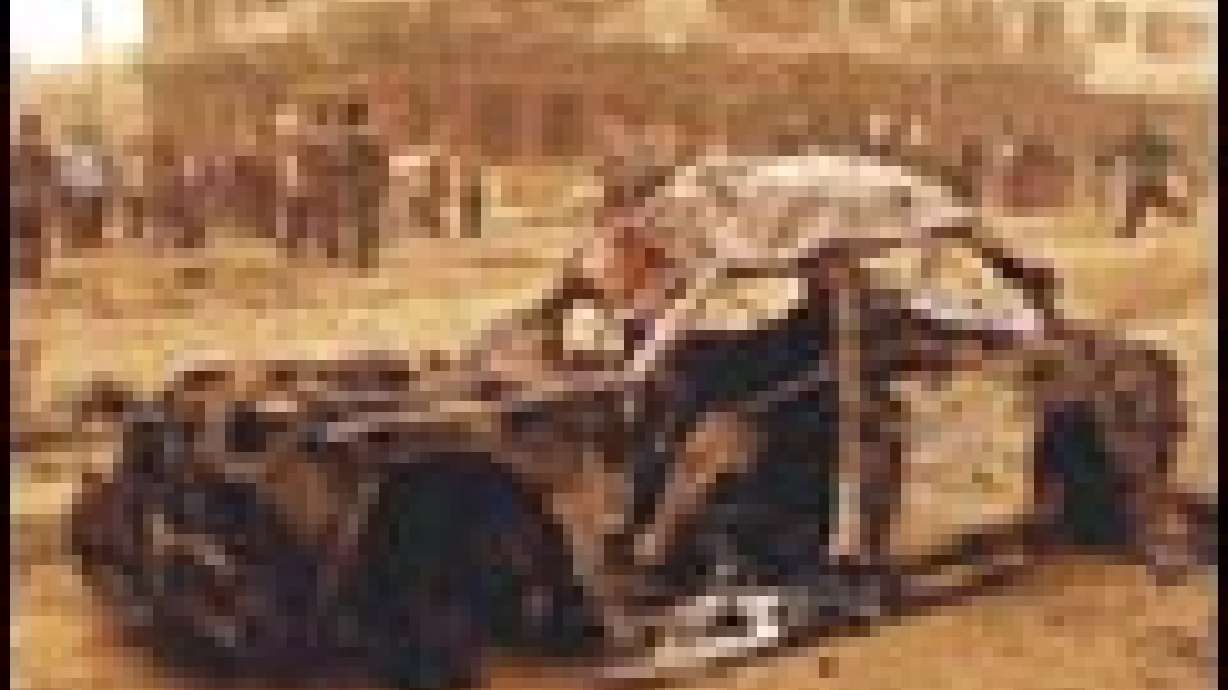Estimated read time: 4-5 minutes
This archived news story is available only for your personal, non-commercial use. Information in the story may be outdated or superseded by additional information. Reading or replaying the story in its archived form does not constitute a republication of the story.
WASHINGTON (AP) -- U.S. military officials on Wednesday denied targeting a residential section of Baghdad where cruise missiles struck near a market, killing 14 people. But they said the incident illustrates how little Saddam Hussein's regime cares about the lives of civilians.
During a briefing at the Pentagon, Maj. Gen. Stanley McChrystal said U.S. forces did not specifically aim at the northern Baghdad community of Al-Shaab, "nor were any bombs and missiles fired" there. But he could not say whether the missiles that did land there were Iraqi weapons, or U.S. missiles that missed their targets.

"We do know for a fact that something landed in the Shaab district," McChrystal said. "But we do not know if it was U.S. or Iraqi. We do know that we did not target anything in the vicinity of the (Al-Shaab) district."
Without offering details, Pentagon spokeswoman Torie Clarke said the fact that Iraq placed missile launchers only 300 feet from residents' homes is "a sign of the brutality of this regime and how little they care about civilians."
Clarke said that U.S. war strategists had gone to great lengths to craft precision strikes on military targets in order to keep casualties low. "Any casualty that occurs, any death that occurs, is a direct result of Saddam Hussein's policies," she said.
McChrystal said since that the start of the war, the United States had launched more than 600 Tomahawk missiles and 4,300 precision-guided weapons. More than 250,000 U.S. troops and 40,000 troops from other countries are deployed, he said.
The soldiers are making their way toward Baghdad, clearing out pockets of resistance along the way -- including from the Fedayeen Saddam, a militia that has been rallying other Iraqi forces to fight and in some case reportedly keeping them from surrendering.
The unexpected level of resistance and battering sandstorms are creating a drag on troops headed to Baghdad, where Saddam and his regime are expected to make their last stand, said officials at the Pentagon and the U.S. military command center in Qatar.
Storms grounded scores of coalition aircraft Tuesday, blinded the array of electronic eyes needed to target Iraq and were gumming up guns, breaking down engines and generally slowing a military campaign designed for speed.
The Fedayeen -- which means "those ready to sacrifice themselves for Saddam" -- are accused of organizing such battlefield ruses as posing as civilians and faking surrenders in order to ambush invading forces.
Intelligence officials say there could be 30,000 to 60,000 of them, with chapters assigned to each Iraqi province to assure loyalty to Saddam. Other militia groups, including from Saddam's Baath Party, also are operating, and some have been captured, officials said.
Rather than racing toward Baghdad as they have in the last few days, Marines on Wednesday slowed their advance, opting to send patrols out from their convoys to take out mortar nests and other enemy targets.
One Defense Department official said commanders were surprised by the capability of the Fedayeen, another by its brutality in forcing regular Iraqi army troops to fight. Another official said the group has shown tenacity and that it was expected that it would present the biggest problem in Baghdad rather than in the south.
"We're going into a hunting mode right now," said Lt. Col. B.T. McCoy, 3rd Battalion, 4th Marines. "We're going to start hunting down instead of letting them take the cheap shots."
Meanwhile, the Air Force used an experimental bomb to try to knock out Iraq's state-run television. Officials declined to describe the weapon, though they have said in recent months that they were developing a bomb that would emit an electromagnetic pulse to disrupt computers, communications and other equipment.
Also in the package of strikes were Tomahawk cruise missiles and other precision-guided bombs. Television broadcast were back on the air about eight hours later.
Officials expressed caution about a report that some of the soldiers from a maintenance unit captured over the weekend were executed as they attempted to surrender.
Officials said they had one report and that they were looking into it. Five from the unit were shown on Iraqi television as prisoners of war.
Defense officials also revised to 350 the number of Iraqi forces killed in fierce fighting Tuesday for a key Euphrates River crossing about 90 miles south of Baghdad. The number had been widely estimated Tuesday at more than 150 Iraqi fighters and possibly as many as 500. No American casualties were reported from the battle, which pitted an American armored division against Iraqi infantry..
The prospect of a chemical attack loomed Wednesday. Marines in southern Iraq Tuesday found more evidence that Iraq was planning an attack with chemical weapons: caches of gas masks, protective gear and nerve agent antidotes in a hospital U.S. officials said Iraqi soldiers used as an illegal staging area.
Officials have said that the closer troops draw to Baghdad, the more likely the possibility a cornered regime will strike out with weapons of mass destruction. Saddam has said he has none and President Bush has said his refusal to disarm is the reason for the war.
(Copyright 2003 by The Associated Press. All Rights Reserved.)









